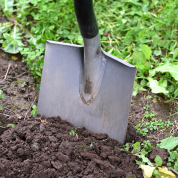This page gathers information and tips for sustainable everyday life, focusing on housing, food, and consumption. Sustainable transportation is covered more extensively on the Work and Studies page.
Individual actions may feel small compared to political decisions or corporate operations, but they are still significant. Every sustainable act can inspire others to follow suit. The more people choose sustainable options and expect the same from decision-makers and businesses, the more society will move towards a future where responsibility becomes the norm.
As the climate changes, there are things we should all be prepared for – even at home. This page also offers ideas on how you can act and prepare for the future. Climate change is already affecting life in Turku.
Housing: what can you do?
Housing accounts for about a quarter of household emissions in Turku. Whether you live in an apartment building, a terraced house, or a detached home, your choices can influence energy use – and thereby, the climate.
The keys to climate-friendly housing include choosing a reasonably sized home, a well-connected location, energy efficiency, and low-emission heating systems. Your home’s location affects whether you can walk, bike, or use public transport for daily errands.
If you live in a detached house, you can make independent decisions about your home’s energy solutions, renovations, and the vegetation in your yard. In other housing types, residents’ meetings or housing associations are the right places to bring up ideas and initiatives for things like energy renovations, recycling improvements, or making green areas more nature-friendly.
Learn about the natural species and growing conditions on your property and consider these in your yard maintenance. Trees and bushes provide food and shelter for birds, squirrels, and insects. Diverse vegetation – such as wildflowers, herbs, and insect hotels – attracts pollinators. These same solutions help manage stormwater and cool the area during heatwaves.
People in Turku often spend their free time at cottages or in the archipelago. If your cottage or home is outside the sewage network, it’s especially important to manage wastewater properly. Many other small house and cottage practices also influence the cleanliness of the Baltic Sea and other water bodies. For example, use fertilizers sparingly and prefer natural ones. Reducing unnecessary chemicals at home and in daily life also decreases chemical loads in waterways.
You can reduce emissions through everyday choices like:
- Choosing a renewable electricity contract
- Lowering room temperatures
- Buying second-hand appliances and furniture, and repairing what you already own
- Sealing windows
- Using water and electric saunas in moderation
- Minimizing waste and recycling effectively
- Creating a nature-friendly yard
- Treating wastewater properly
Related content:

Food: what can you do?
Food choices can reduce your carbon footprint and help steer markets in a more responsible direction. A plant-based diet or increasing the use of plant-based proteins are effective ways to do this, as encouraged by national dietary guidelines. However, there’s no need to change your eating habits all at once – simply adding more vegetables to your diet is a big step toward more sustainable eating.
Avoiding food waste, choosing locally produced food, organic products, and seasonal produce also represent more sustainable eating. If you harvest mushrooms, berries, fish, and other natural foods yourself from local nature, you can accomplish several good things in one trip to the woods. Turku Market Square, the Market Hall, and the REKO producer circles are great places to find locally produced food.
Related content:

Consumption: what can you do?
Homes are filled with furniture, décor items, materials, and various appliances and devices. The "Three R’s" rule applies to these purchases: reduce, reuse, recycle. You can read more about sustainable consumption on the Leisure and Recreation page.
In Turku, there are plenty of opportunities to buy second-hand items. For example, you can find great deals with peace of mind at Ekotori, which is part of the Turku Climate Team.
Sharing and borrowing are also excellent ways to reduce consumption and save both the environment and your wallet. The sharing economy is based on the idea that we don’t need to own everything. We can share, rent, borrow, exchange, and sell goods as needed.
Related content:

